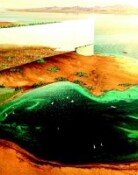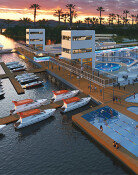Extended cold wave freezes key NK sectors of fisheries, shipping
Extended cold wave freezes key NK sectors of fisheries, shipping
Posted February. 10, 2012 07:59,
North Korea`s fisheries and shipping industries, two key earners of foreign currency for Pyongyang, have effectively been shackled due to a prolonged cold wave that has frozen waters in the Yellow Sea.
With the temperature reaching minus 10 degrees Celsius for more than a month, more than 40 kilometers of sea water in the Yellow Sea off the North`s coast have been frozen. This is the first time in decades that about 200 kilometers of the North`s coastline from the mouth of the Yalu River to the North`s Hwanghae provinces have been frozen.
Experts say the frozen water will not only affect the Norths fisheries and shipping industries, both of which are major earners of U.S. dollars, but also the Stalinist country`s economy and newly launched Kim Jong Un administration.
○ Massive ice blocks cover 200 kilometers of N. Korean coastline
In Seoul, the Korea Center for Atmospheric Environment Research and the Korea Meteorological Administration said Thursday that based on analysis of satellite images, massive ice 40 kilometers wide was detected in North Korean coastlines spanning 40 kilometers from the mouth of the Yalu River to coastal waters off Pyongyang.
According to the analysis, Korea Bay located in between the Norths Cholsan and Changyon peninsulas has remained frozen since Jan. 10 due to the cold wave. Coastal waters of Unryul County in South Hwanghae Province, the Chongchon River flowing into Korea Bay, and the port of Nampo at the mouth of the Daedong River running through Pyongyang are also covered with ice.
Chung Yong-seung, director of the environmental think tank, said, In the past, waters off the North Korean coast used to be frozen. But the formation of such large-scale ice is unprecedented.
Experts blame arctic ice moving south due to global warming for the ice formation.
North Korea has been hit by a severe cold snap this winter. According to the South Korean weather agency, the Norths average temperature last month was minus 8.4 degrees, 0.7 degrees lower than in an average year.
The Chosun Shinbo, the official newspaper of the pro-Pyongyang Federation of Korean Residents in Japan, recently said, Temperatures in Pyongyang remained below zero from Dec. 23 last year through Jan. 31, the most extreme cold since 1945, adding, North Koreans can even walk on the Daedong River.
Temperatures in the North fell further this month to minus 11.1 degrees on average, down 4.6 degrees from an average year.
○ Big burden on N. Korean gov`
The ice formation in North Korean waters is pressuring the Kim Jong Un administration economically, experts said. The combined share of fisheries and agriculture in the North`s GDP is 20.8 percent, eight times higher than for South Korea (2.6 percent). Fisheries also play a key role in sustaining the North`s economy with catch volume reaching 630,000 tons a year.
Pyongyang`s dollar earnings have also been hit hard due to the frozen sea that has prevented fishing boats from leaving ports. Goh Yoo-hwan, head of the (South)Korean Association of North Korean Studies, said, The North should export primary products such as fisheries goods, but no fishing operations due to the frozen water will take a huge toll on the North`s dollar earrings.
Waters near Chinas Liaodong Bay and Russias Vladivostok have also been frozen, causing the Norths maritime transportation to go awry. Due to soured inter-Korean relations, the North`s trade with the South and Japan has declined and raised the Stalinist countrys dependence on China to 56.9 percent.
Kim Yong-hyeong, a professor of North Korean studies at Dongguk University in Seoul, said, If the ice formation in waters wreaks havoc on the Norths maritime transportation, this will destabilize the North Korean economy.
The problem is that ice at sea is growing thicker. The National Meteorological Satellite Center in Seoul said the boundaries between ice blocks and waters in the Norths section of the Yellow Sea were vague last month, but grew clear this month with ice getting thicker.
Director Chung of the environmental think tank said, Given North Koreas weather conditions, the ice in the sea will grow thicker through early next month, adding, North Korean society will be hit hard if its fisheries and shipping industries are grounded for more than two months.
zozo@donga.com
Headline News
- N. Korea launches cyberattacks on S. Korea's defense companies
- Major university hospital professors consider a day off each week
- Italy suffers from fiscal deficits from ‘Super Bonus’ scheme
- Inter Milan secures 20th Serie A title, surpassing AC Milan
- Ruling and opposition prioritize spending amid tax revenue shortfalls






